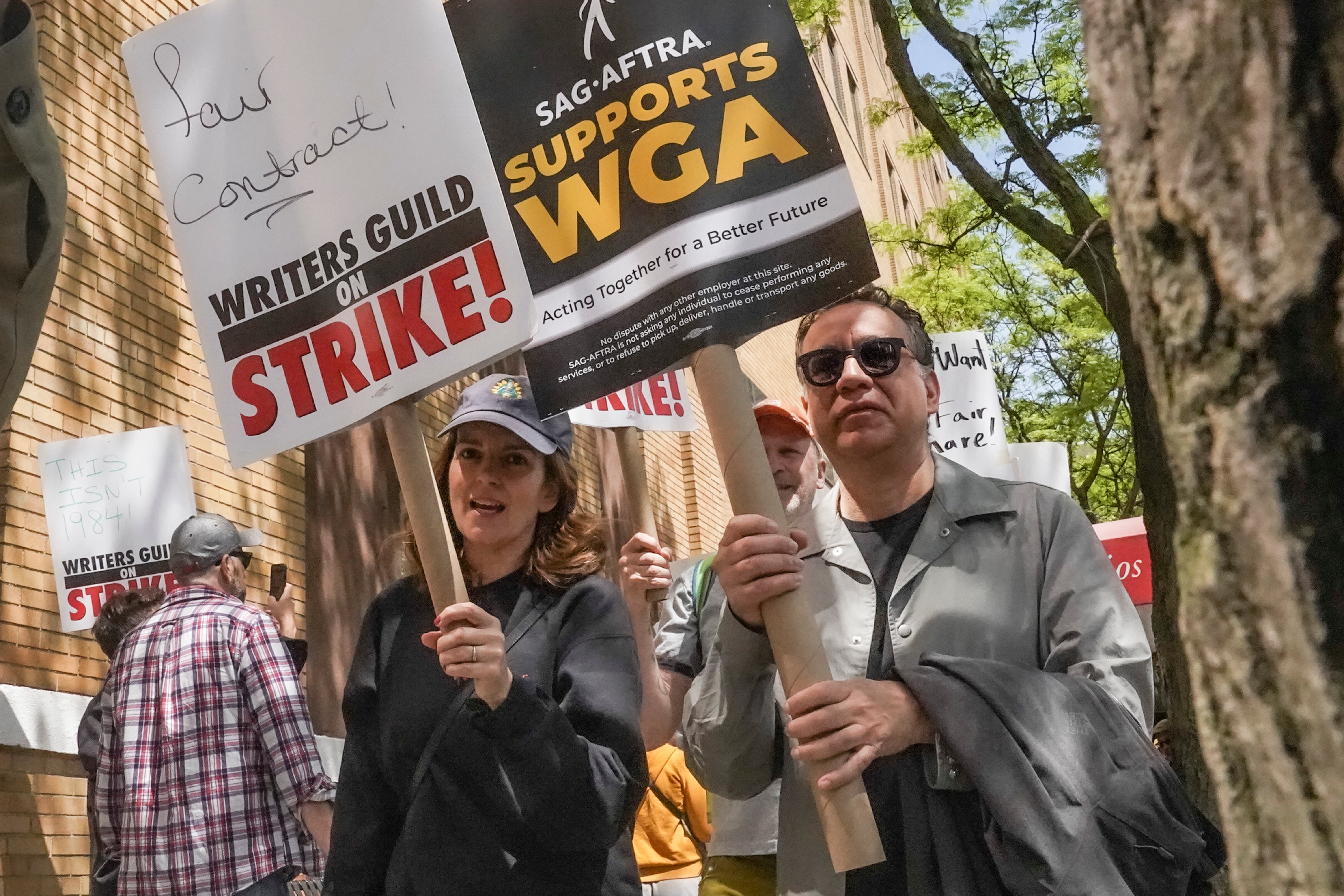The Independent's journalism is supported by our readers. When you purchase through links on our site, we may earn commission.
Hollywood strikes are the result of our addiction to streaming TV
As big name actors join writers on the picket lines, David Arditi asks whether we’ve reached a film and TV tipping point – and unpicks what might be on the other side


As the television writers’ strike has dragged into its third month, actors are now joining them on the picket lines. Streaming culture was supposed to bring us unlimited access to TV and film content, but it has trapped many actors in a position of insecurity.
As television has passed through its “golden age”, I think streaming culture fundamentally changed the way television production works. A change that I think has made television better.
I’ve never been a fan of formulaic sitcoms and police dramas, but I am a huge fan of streaming television. My wife and I spend our evenings bingeing television on various platforms from heartfelt Ted Lasso to the more disturbing Squid Game. While the content has improved, the basic structures of TV have changed as well.
Streaming culture deployed a new system of precarity on Hollywood actors. The tale of aspiring actors flocking to Los Angeles, California for the chance to star in film and television is as old as Hollywood. It created the dominant trope of struggling actors making ends meet by working as servers in restaurants.
I see this again and again in television shows from Penny working at Cheesecake Factory in Big Bang Theory to Sally Reed serving tables on Barry. The dream to make it “big” creates an environment where producers can take advantage of Hollywood newbies.
But actors are just as likely to play small roles in TV, film and commercials that don’t pay enough to support their livelihoods. And streaming culture has changed production in a way that makes these struggling actors’ lives more difficult.
To meet the demand for new content, producers have shortened the average length of television seasons. At the same time, the gap between seasons has increased. Many of the actors on these shows have contracts that prohibit them from working on other shows or films, which makes it difficult for them to know when their next paycheck will arrive between seasons.
At the same time, media executives are seeing record pay. Deadline reports “CEO compensation last year averaged about $32m for 13 CEOs at 12 media companies (Netflix has co-CEOs), with several executives crossing the $50m mark.” I would much rather see my subscription fees go to struggling actors than the likes of Rupert Murdoch and Bob Iger.
The difference between low-level actors and executives highlights what I call digital feudalism. Digital feudalism is the current era of capitalism, an era that looks remarkably similar to the moment of transition from feudalism to capitalism.
As capitalism started in England, parliament passed a number of land enclosure acts. These laws kicked serfs off the land and sent them to cities looking for work. Former serfs created an oversupply of workers and drove wages down. Serfs lost stability in their everyday lives as they were thrust into a new working relationship.
There are three dominant characteristics in digital feudalism: precarious labor, increased consumption, and debt peonage. First, people consume more, primarily through subscription services. More goods and services are available through subscriptions, especially streaming television platforms.
Second, we see an increase in precarious jobs as part of the gig economy. Gig work lacks full-time benefits, security, and stability. Third, to deal with the first two characteristics, everyone has to purchase things through debt. In fact, consumer debt in America increased by 18.5 per cent in 2022 alone. Jobs provide less security and less pay at the same time we are asked to consume more, which leads people to buy everything on debt.
Streaming television brought about the golden age, but the gold prospecting has slowed. I now find myself wanting more TV because we binge shows and wait for two years to see what happens.
And the new TV gold mine was more lucrative for streaming platforms than writers and actors. Short seasons with large gaps between them, placed TV actors and writers in a precarious position where they lined up work, but the work itself was inconsistent.
An eight-episode season of a popular show that has a two-year gap between seasons leaves TV actors wondering how they will pay their bills between seasons. More dramatically, the seven-year rule in California exempts actors from the ability to leave these contracts. As actors wait to see if a show will be renewed for another season, their contracts don’t allow them to find paying work in Hollywood.
But the biggest issue for Hollywood actors stems directly from the digital era: Artificial Intelligence (AI). Just as we are all at risk from the influence of AI across multiple sectors, actors worry studios will use AI to create their digital likeness and current contracts don’t provide them with any protections. Then studios will never have to pay stars to be in their shows and films.
At the moment, AI is the major sticking point for both actors and writers, and studios refuse to negotiate on the issue. Executives see the potential to cut out layers of creative labour in the production process to increase their profits. Streaming companies want to deploy AI to limit even the most basic stability they have in their employment: their image.
TV actors are serfs who work for large corporate lords while failing to make enough to meet their needs. Actors need stability and dignity offered to other types of workers.
David Arditi is an associate professor of sociology at the University of Texas at Arlington, a scholar of digital technology and an expert on streaming cultures






Join our commenting forum
Join thought-provoking conversations, follow other Independent readers and see their replies
Comments